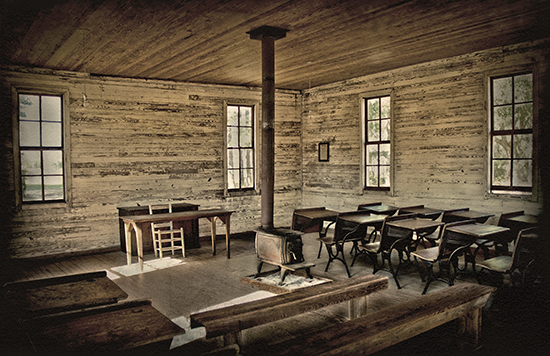
December 2019 -January 2020
On Assignment
------------------
|





A Day on Happy Ridge
By Bill and Brenda Evans
Late June brought unusual rain—heavy, soaking, unrelenting. But the Wednesday we went to Happy Ridge dawned sunny, though humid and hot. We breathed steam, it seemed, but at least no water pelted us from the sky. It was a good day.
Iron ore was once dug from Happy Ridge. Farther west surface coal was extracted bucket-by-bucket and natural gas wells bored here and there in yards and fields to heat homes. Long-abandoned iron furnaces, coal-black cavities in hillsides, and depleted gas wells still dot the landscape as reminders of that past. Northeast Kentucky has long been known for its rich underground.
But we didn’t go to Happy Ridge to scour the underground. We went to find remnants of a one-room school that once stood on the crest of the ridge alongside a family cemetery. Our friend Frances Mae Wilson Rayburn, ruler-straight and pencil-thin, walked ahead of us, carrying us into the past. She had gone to Happy Ridge School as a child, and at age 19, she taught there. All eight grades, ages six to 16, in a single room with a warped front door, six tall windows, a cluster of students’ desks, red-hot pot-belly stove, and blackboard.
We didn’t find the stove or grayed oak floors. No foundation stones. No bare ground where children dug out grass to mark bases for their ballgames. No girls’ and boys’ toilets or piles of black coal out back.
After 62 years, all that was left of Happy Ridge School was a slight curvature in the soil, a wide grassy dimple of sorts. A faint dip in the landscape said Happy Ridge School once stood there and was the place where six-year-old Frances recited her ABCs and, later, as a 19-year-old, taught those ABCs, along with reading, math, health, and science to 15 or so children in that one-room school on a grassy ridge in Greenup County, Kentucky.
We walked in her tracks as she looked out over the ridge, and we knew she was looking back, too, to recall how it once was on Happy Ridge. She pointed left, toward the cemetery fence. “In warm weather, we played ball on Friday afternoons,” she said. “If the ball went across the fence, one of the big boys would go after it. In cold weather, we had spelling bees inside, or math contests at the blackboard to see who could solve problems the fastest.”
A pot-belly stove sat in the middle of the room on Happy Ridge. Its pipe ran straight up through the ceiling. “In winter, we pulled our desks into a circle around the pot-belly to keep warm,” Frances said. “I went early to start the fire with kindling the children gathered from
the woods and stacked in the corner to keep dry.” She added coal from the scuttle as the fire caught.
If a windstorm blew up, Frances dismissed school, as the superintendent ordered, because Happy Ridge School was unstable. “The walls swayed in and out when the wind blew hard. The floor would buck up so much we couldn’t open the door. So, I’d send the children home before it got bad, like the superintendent told me.”
Each fall at Happy Ridge, the school district furnished bare necessities: two new erasers, a box of chalk, a load of coal, a water bucket, and dipper. Usually, children brought their own fruit jars filled with water, but Frances could send two boys to a neighbor’s well for a bucketful when needed.
Discipline was limited and simple. “If you fought on the playground, you’d get one lick with a small paddle. That was all,” Frances said. “But I expelled two big boys for three days one time. They were about 16 years old and fighting. I wasn’t but 19 myself. Their parents said I had done the right thing and to do it again if I needed to. I had no more trouble with them.”
After high school, Frances went right to summer school at the community college in Ashland, Kentucky. One day at the college, she overheard a superintendent’s wife talking about emergency teaching jobs in nearby Greenup County. “Daddy took me to the superintendent’s office and said, ‘Now go in there and tell him you want a job.’ So I did.”
The superintendent hired Frances on an emergency basis for a one-room school. If she stuck it out at the community college, he said, then went on to Morehead State University and got her degree, he would keep her on in the district. That first year, at age 18, Frances was assigned to Oldfield, a one-room elementary school several miles from Happy Ridge. Her salary was $129 a month after taxes, $30 of which went for room and board with an older couple who lived less than a mile from Oldfield School. She and a neighbor boy walked to school together.
The old man of the house turned out to be a matchmaker as well. “He told me he had someone he wanted me to meet. It was Ray Rayburn, just back from Korea and about to re-enlist. Ray was friendly, good-looking, and never met a stranger—probably was a lady’s man, too,” she laughed. “He’s the first and only one I dated.” Ray and Frances married a year later and eventually raised two daughters while Frances continued to teach, finished a bachelor’s degree, then went straight into a master’s program. For her second year in the Greenup County School District, she was transferred to Happy Ridge.
“So much has changed,” Frances said, looking out over the ridge. “My father owned 60 acres here. All those trees and bushes have grown up into what was our land. He kept it cleared and mowed. Our house was down there.” She pointed to the east, down a path-like road through the woods. “It was a log house built by ore diggers working these hills way back. Two rooms, and Daddy added on. It’s hidden now, but I think it’s still there. We can’t go look. The owner has it posted.”
Frances taught at Happy Ridge two years, then Greenup County closed all one-room schools, and Happy Ridge School went up for auction. “Daddy bid on it, but when it went up to $75 dollars, he backed away. The buyer tore it down, and I went on to teach in the consolidated elementary school at Danleyton.”
In the new school, Frances left behind black snakes that climbed up window facings, old Ben and Alice Readers from American Book Company, the annual two-erasers-and-a-load-of-coal allotments, and fox hunters that came into Happy Ridge School on cold nights. “Those fox hunters made fires in our pot belly stove with kindling the school children had gathered from the woods and stacked in the corner for me. They never bothered anything except my kindling, but I was done with that,” she laughed.
The consolidated elementary school gave Frances larger class sizes, but also more resources: wall maps and globes; long, green ABC lettering guides on the wall; the Ten Commandments and Preamble posters; mimeographed coloring sheets; an American flag. At times, Frances served as a reading specialist and librarian as well.
Frances’ parents were Christians. “Daddy put benches in the back of his pickup truck and took us and our neighbors to church and lots of revivals.” She and Ray were Christians, too, and she was free to express her faith in the classroom. “Every morning, we said the pledge, read a Bible verse, and sang a church song. A child led the Lord’s Prayer before lunch. A local Christian woman came and did skits and taught Bible stories with flannelgraph illustrations. Later, all that changed.” In all, Frances taught 33 years in Greenup County. After retirement, she subbed another 12 years in Greenup and three other districts.
“From those first days here on Happy Ridge, teaching was all I ever wanted to do,” Frances said, as she looked out over the grassy ridge one last time.
About the Writer: Bill and Brenda Evans live in Ashland,
Kentucky. Frances Rayburn is their friend and sister in Christ
at Second Free Will Baptist Church. Contact them at
beejayevans@windstream.net.
|
|

